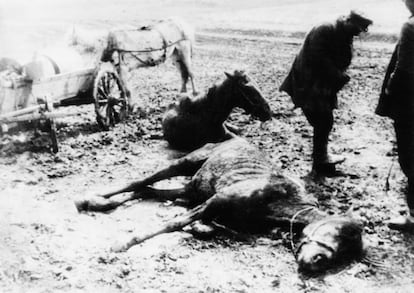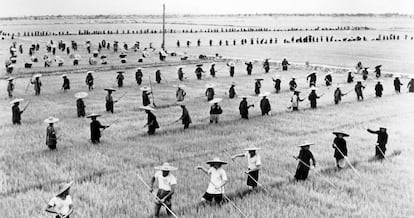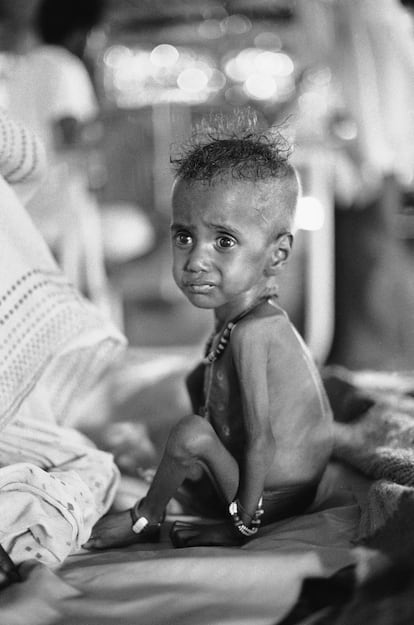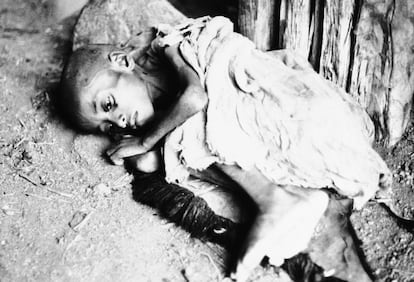For centuries, the history of humanity has been marked by hunger terror. Until the arrival of industrialized agriculture in the twentieth century, millions of people lived with constant fear of bad harvests, cold, heat, hail, lack or excess rain. In Pompeya, the Roman city destroyed by Vesubio in 79, there are bakeries everywhere: the bread was the basis of food and any Roman ruler knew that in order to remain in power it had to guarantee the supply of wheat. In one of his essays on the peasants in the Middle Ages, the French historian Georges Duby thus described the situation in moments of bad harvests: “These periodic crises were marked by permanent hunger and chronic malnutrition, while accumulated in the crossings of roads the bodies without burial, and people were forced to eat anything, earth or human flesh.”
With the arrival of the industrial revolution to agriculture, which meant the increase in production thanks to the mechanization of the field and chemical fertilizers and pesticides, the most optimistic thought that famines were to be part of the past. The opposite happened: hunger remained used as a gun of war, horror or extermination: although it can be identified with sites in ancient or medieval wars, hunger, totally avoidable, has never ended. It is what the Gazatis are now living, deprived of Israel of food and medicines for two months, while the famine becomes increasingly evident. “This is one of the worst hunger crises in the world, which develops in real time,” said the World Health Organization.
The history of Russian scientist Nikolái Vavílov (1887-1943) reflects as no other that politicization of hunger. The obsession of this researcher, whose work Five continents It is published by Jata’s books, it was to maintain the genetic diversity of edible plants. When a single species is cultivated, a plague can cause a cataclysm, as happened with the phylloxera in the nineteenth century, which ended the vineyards of all of Europe (the colonization of Algeria is related to this massive disappearance of crops). Greater genetic diversity means more food security. Traveling all over the planet, Vavílov achieved the largest collection of seeds in the world, but died of starvation: he was deported by Stalin and died in a field of work. His collection was preserved in Leningrad, current St. Petersburg, the city that underwent a wild fence by the Nazis, during which they were hungry between one and two million people – the screenwriter of the series of the series of Game of Thrones, David Benioff, has an excellent novel about that saved, Thieves City (Destination)-. But the guardians of that collection of seeds preferred to starve before eating those seeds destined to the good of humanity: the Vavílov collection was saved and is still a reference.
Throughout the twentieth and twenty million people have starved to hunger, during World War II, the Chinese cultural revolution – Frank Dikötter has an impressive book about that cataclysm, The great famine in Mao’s China (Cliff) -, In Biafra, Sudan … During the forced collectivization of the thirty years, Stalin used hunger to exterminate the peasants with lands of Ukraine, the Holodomor, during which millions of people died – Anne Applebaum makes a creepy story in Red famine (Debate)-. And it is not only about people who starve, but that survivors, and in some cases their descendants, will be marked, physically and psychologically, forever.

Audrey Hepburn actress lived the famine suffered by the Netherlands between 1944 and 1945: the comic Audrey War (Planet), from Salva Rubio and Loreto Aroca, recounts his life during the so -called hunger winter, which caused 20,000 deaths. He became several days without eating anything, which changed his metabolism forever. When she retired from the performance, the protagonist of Breakfast with diamonds He dedicated his life to helping children victims of hunger through UNICEF. Those who suffered the hunger of war and postwar in Spain were also marked: Carlos GiméneZ has told it as nobody in his series Paracuellos. The scene with which your comics begins Barrioin which a child eats for the first time a fried egg, reflects what it means having been days and nights without eating, because hunger never leaves, never disappears. “Hunger never ends up removing at all,” he said in an interview. “The food has for me a value above the money that costs, it is the value of the person who has been hungry and that has it recorded over fire.”
Amartya Sen, Nobel Prize in Economics in 1998, witnessed a child of the famine in Bengal of 1943, which led him to study this phenomenon throughout history. Its conclusion is that contemporary famines have been all provoked and that a democracy has never suffered a famine. In his memoirs, A home in the world (Taurus), writes: “There is a huge difference between accessibility to food (how much food is in the entire market) and the right to food (how much food can each family buy in the market). Hunger is a characteristic of people who cannot buy enough food in the market; it has nothing to do with the amount of food in that market. In the 1970 focus on the right to food, not on their availability. ”

He also studied Thomas Keneally, the Australian writer known worldwide for Schindler’s list, that Steven Spielberg led to the cinema. Influenced by her Lotethya Sen readings and by her experience as a reporter during the Hambruna of Ethiopia, Kenealylly recounts in Three Famines: Starvation and Politics (Publicaffairs) Potato famine in Ireland “That the history of this country and the United States changed for mass emigration,” from Bengal and Ethiopia. His theory is that all those who have suffered hung coffin ships of Ireland with those who suffered the Spanish postwar period. “As separately, they are in time, they become members of the nation of the families, who have more in common among themselves than with the cultures that famine steals them,” writes Kenealle.
This week Marcel Ophuls died, the French filmmaker who entered the most sinister corners in the history of his country with the documentary Penalty and piety And that said goodbye to the cinema with Watches of arms: History of journalism in wartime, A documentary about the siege of Sarajevo by the Ultra -Nacionalists Serbs, during which the Bosnians also suffered hunger. At the start the actor Philippe Noiret appears and makes the following reflection: “After World War II we asked ourselves that, if we had seen those horrors live, maybe I had changed something. Now we are seeing what is happening in Bosnia and we know that nothing will change.” It is a phrase that has deep echoes in the present, because none can say that we are not seeing what happens in Gaza.


